#anti eastern european sentiments
Text
Am I the only one here who is so damn angry about the fact that a large portion of the Slavic representation on the Western media is either Russian, Russian-coded (e.g. the Grisha Universe by Leigh Bardugo) or copies the narratives about other Slavic nations that exist in the Russian discourse about them?
#russian colonialism#russian imperialism#russia#ukraine#slavic nations#Slavic people#eastern european#anti eastern european sentiments#slavic representation on the western media#western media#Russia centrism#poland#czech republic#slovakia#Belarus#croatia#bosnia#bosnia and herzegovina#serbia#Macedonia#Bulgaria#slavic countries#pop culture#eastern europeans of tumblr
2K notes
·
View notes
Text
I hate when people - mostly Americans - feel like they have the right to shit on Slavs just because we're white. (Which is not true btw, I know a lot of POC Slavs).
Like, yeah our countries are a bit behind, you know why?! BECAUSE WEST NEVER BOTHERED TO HELP US, THEY ONLY EXPLOITED US.
Yeah, some of us live in horrible conditions without running water and bathroom in the house. Why? Because even now no one bothers to help them.
Yeah, many Slavs don't like foreigners. Why? Because of generational trauma that happened less than 80 years ago.
Yeah, many Slavs are uneducated because they didn't have the opportunity to get proper education.
But we're not primitive subhumans as many treat us. We're not inferior.
And when we speak up about our issues, when we want to educate others so they stop harming us with stupid stereotypes, WHEN WE DEMAND BASIC RESPECT FOR A HUMAN BEING
What happens then?
We're called delusional. We're being said that "we just want to steal attention from actual problems because we're all racist pigs", we're being told that our issues aren't that big, right? We're white, so we have sooo many privileges, we definitely weren't oppressed throughout the centuries
Rant over
#tw: rant#rant#slavic#slav#Eastern European#eastern Europe#slav issues#slavophobia#poland#slavs#anti slavic sentiments#anti slavic
215 notes
·
View notes
Note
I was reading your post about how Gortash is so polarizing in how people respond to him and while I don’t have an answer, I can weigh in on the side of thinking he’s attractive and not understanding some of the complaints people have. I try to see what it is that makes some people go ewwww no way but I don’t see what they do. For example a lot of people will say he looks dirty and I feel like I’m missing something completely. He looks unkempt but his hair looks shiny and clean and there’s no stains on his clothes. There’s scars and age marks and stubble on his skin, but I don’t read that as dirt (maybe I’m wrong)? His teeth aren’t perfectly white but thats the case for anyone who drinks coffee or tea so that doesn’t mean anything about hygiene. It also feels like people mistake his skin for just being dirty instead of not pasty white. Also when I see comments about “this guy must smell bad” and I immediately think of that journalist who made a remark about zendaya smelling like patchouli and weed because it feels like it’s coming from the same mindset and is sometimes word for word literally just that. This isn’t even touching on the fact that he’s got wrinkles and dark under eyes and signs of age and trauma that aren’t cute or superficial. I’m saying that the haters are all racist or ageist but I think there’s some biases at play and no one feels like they need to think about it too deeply because he’s an antagonist.
Yeah, I definitely agree with your takes here. I’m also someone who thinks he’s attractive and never really had a problem with his design. I don’t really care for the hair and think it’s a little goofy, but overall he’s very handsome (and the outfit is drippy af).
I will say that his model actually DOES have dirt on his face. Like those spots are the in game dirt feature (idk if that’s the right word). I’m not sure if that’s to have age spots or show that he’s a little disheveled, but yeah he is actually dirty in game lol but I’m with you in never thinking that he was dirty or smelled bad. But he doesn’t look like an archduke and I think that’s the point of his design; he’s a fraud and a tyrant (aka a bad leader).
And I definitely think a lot of the criticism for his design comes from racism and ageism. And I’ll preface this by saying that I’ve always read Gortash as being inspired by Turkish and Bulgarian people looks-wise. The constant insults of calling him disgusting or dirty make me side eye cause I do think it comes from his darker complexion and “unconventional” features that are more common in Türkiye and the Balkans.
Like I can only speak as a Bulgarian, but people in Western Europe treat us like shit. They call us dirty, untrustworthy, mafioso, ugly, etc. like Western Europeans fucking hate us. In America, it’s not as bad but we still have a negative image (in my experience. I’ve been told I’m poor and from a country that shouldn’t exist before). And I’m very white, so I can’t even imagine what it’s like for those with darker skin tones. So, I think people carry this bias against people that look like Gort and don’t think deeper about it when they say these things (or redesign him). I find it very hurtful tbh because I really loved seeing a character that looked like him. He’s very unique amongst the other character models.
And obvs, ageism is a huge problem that people also won’t confront with themselves. And all this combined with bad media literacy (imo) like they cannot get over the “young and handsome” part for some reason and it’s so annoying.
Anyway, I’m rambling and prob not making a lot of sense cause I’m tired lol but yes! I agree with you. Luckily, it seems like Gort has a pretty sizable fanbase and a lot of people love him! So, it’s not all bad. But I wish people would maybe think a bit longer about some of their opinions on him. Cause he’s a horrible person! But we don’t need to constantly call him dirty or disgusting or whatever. But that’s just where I stand on this whole thing.
#asks#anti Eastern European sentiments are very strong still so seeing that in the bg3 fandom hurts my feelings ngl#and I’m prob reading too much into it but feelings aren’t rational but yeah#bg3#Gortash
10 notes
·
View notes
Text
While Russophobic allegations of someone being a "Russian psyop" are a thing, one thing that those outside of the Russian political sphere need to understand is that the Putin government DOES use bots and paid shills on websites such as Tumblr, masquerading as marginalized minorities in order to sway elections. While this shouldn't cause you to mistrust accounts of minorities, you DO need to be aware of a few different kinds of rhetoric that are attempts to make you into a useful idiot to Putin's authoritarian regime:
ANYTHING telling you not to vote in elections, or anything saying that democrats and republicans are the same/republicans are better than dems for minorities just bc dems have issues
anti-Ukraine sentiment, claiming that what Russia is doing to the people of Ukraine is not a genocide (and yes, I am Russian, I don't hate all Russians, shut up)
"Nazis in Ukraine" or defending Russian settler colonialism in eastern Ukraine by ignoring the fact that Russian settlers swayed elections in the area
anti-west sentiment in general. "the west is so weak and degenerate unlike the glorious east." This talking point is used by tankies as well as Putin-affiliated users, but shouldn't be confused with the general critique of European white supremacy.
antisemitism of any kind, but especially rootless cosmopolitan rhetoric and holodomor denial.
This rhetoric is used and spread around by a lot of people, and doesn't 100% guarantee that whoever posts this is a bot, but these are just some of the ideas to avoid if you don't want to fall for the paid shills that are objectively on these sites.
Remember, people can go on the internet and just lie. People can claim to be from anywhere. We've caught a lot of people pretending to be Jewish online in the past few months to validate their opinions on Israel. Stay vigilant, don't play into the hands of a genocidal monster destroying a smaller nation.
Check For Comprehension
How is OP more qualified than the average person to speak on this subject?
Is OP advocating for uncritical support of the US/western governments? Might there be a middle ground between uncritical support and uncritical condemnation?
Did the statement about antisemitism make you uncomfortable or angry at OP? If you answered yes, why might that be, and how should you change that?
Can people lie about personal characteristics such as identity and background on the internet? If so, what might be some evidence that someone is a paid shill or just lying?
Did this post ask you to mistrust leftism or minorities?
259 notes
·
View notes
Text
Difference between "Romani"/"Roma" and "Romanian"
I decided to make this post because a lot of people get Romanians and Roma mixed up. It's something that's pretty common, even among Europeans who are more familiar with Roma than Americans are.
"Romanian" comes from latin "romanus", meaning "Roman", inhabitant of the city of Rome (Italy). Romanians are a white people indigenous to (Eastern) Europe living in Romania.
"Roma" (noun) and "Romani" (adjective) mean "people" in Romani language. It probably comes from Sanskrit "ḍoma", which refers to a traveling caste of musicians. Roma are a South Asian diaspora that traveled through the MENA region for about two centuries before arriving in Europe in the Middle Ages.
Many people get Romanian and Romani confused because of the following reasons:
the names are similar: this is true but coincidental, as "Romanian" comes from Latin and "Romani" comes from Sanskrit, and both words have very different meanings
Romania has the largest Romani community in Europe: this is true. The reason is that, upon entering Europe in the Middle Ages, the Roma that arrived in Romania were enslaved and couldn't move out of the country. The slavery of Roma in Romania lasted 500 years. After it ended, in the mid. 19th century, the majority of those Roma remained in Romania, though a few of them migrated to America and to Western Europe.
TL;DR
The Romanians are indigenous to Europe. The Roma are indigenous to India.
Romanians are usually Orthodox Christians. Roma can be of any religion, typically converting to the dominant religion of the region we settled in.
Romanian culture (singular) is a unique culture that was influenced by its proximity to Slavic, Greek, Hungarian, German cultures. Romani cultures (plural) are of South Asian origin and were shaped over the centuries by our travelling through the Middle East and Europe.
Romanians live in Romania. Roma don't have a particular country.
The reason many Roma live in Romania is because Romania has a long history of anti-Romani racism and slavery.
Romanians often suffer from xenophobia when living abroad because they are (white) Eastern Europeans. Roma suffer from racism and xenophobia: we are a brown people whose cultures are very identifiable as non-European. As such, we have suffered and still suffer segregation, police brutality, ghettoization, slavery, pogroms, slaughters, discrimination in the workplace and in education. Anti-Romani racism is still the most widespread form of racism in all European countries to this day.
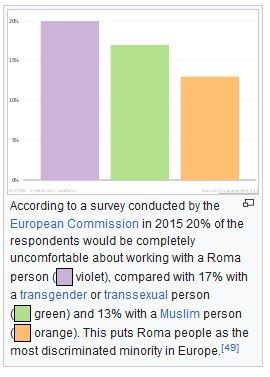
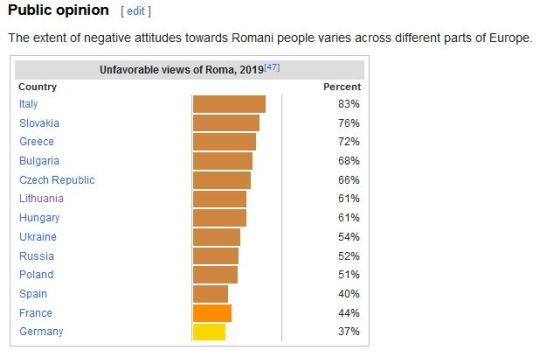
The majority of Roma, especially those living in Eastern Europe, ie around 2/3rds of Roma, are visibly brown, because of our mixed ancestry (South Asian + MENA), though some groups can be lighter due to interracial marriages with white people. It's the case of the British Roma, in particular.
Our traditions, culture and belief system evolved with us from India through the Middle East to Europe. It is thus pretty recognizable as "non-European" and has been used to identify us as "others/foreigners" over the centuries. FYI, there is not one single and unique Romani culture, because cultural beliefs and practices, as well as religion and Romani language dialect can vary a lot between each Romani group. To make it more intelligible, I invite you to think of the larger Romani diaspora as one race that is composed of a manifold of Romani ethnic groups.
Romanian

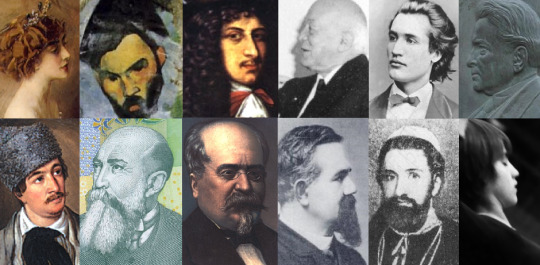





Romani (adjective) / Roma (noun)
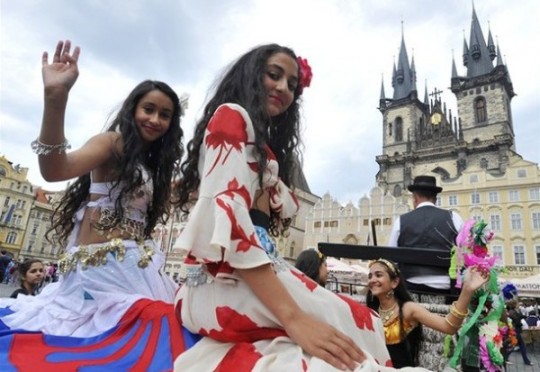
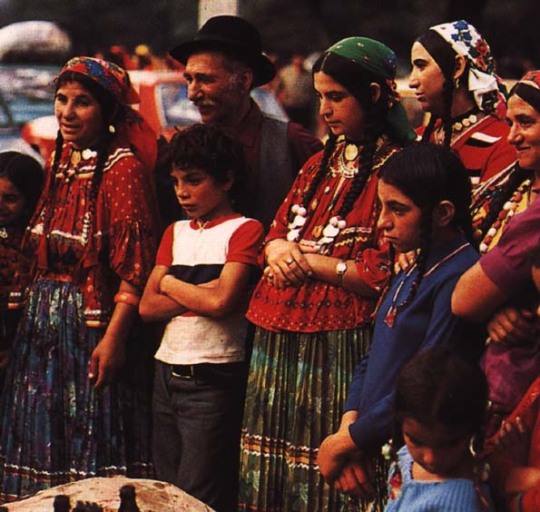
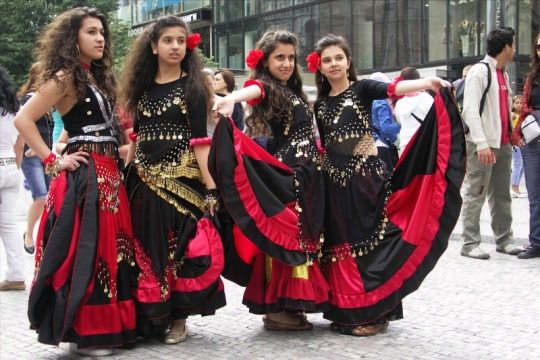
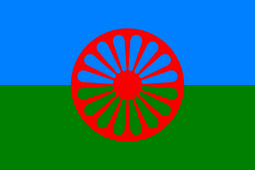


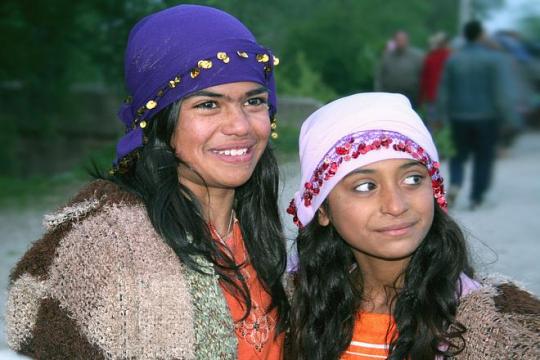
(I have more of these in my "Roma" tag)
Roma =/= Romanian. Romanians are European while Roma are a South Asian diaspora. While Romanians do suffer xenophobia when living in Western Europe and America, anti-Romani sentiment is a type of racism widespread in all of Europe and America. It's particularly important to know the difference between Roma and Romanian, as Romania has a very long history of racism against Roma: slavery, segregation, ghettos, genocide.
#roma#don't hesitate to ask questions if something isn't clear or if you wanna know anything in particular!!
193 notes
·
View notes
Text
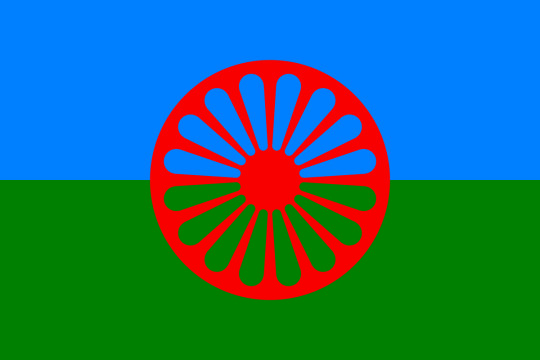
Today (April 8) is The International Romani Day. The Romani people (also called Rromani, Romany, Roma) are Europe's largest ethnic minority with an estimated 10-14 million people, though knowing exact figures is hard because the Romani often live on the fringes of society and many Romani choose not to disclose their ethnic identity. The Romani are unique among peoples in the sense that they've never identified with any territory or claimed they have a homeland where they came from. Their origin was somewhat a mystery for a long time (the slur "gypsy" comes from Europeans thinking they came from Egypt) but later genetic research has traced their ancestry to northern India and more specifically to the casteless Dalits. The Romani arrived in southeastern Europe by the 1300s and in western Europe by the 1400s, and in modern times the live in every continent.
The Romani experience a very high level of discrimination and marginalization and are among the most persecuted groups of people in the world. The entire history of the Romani people has been filled with ostracization, deportations, slavery, and systematic abuse ranging from segregation to forced sterilizations. Anti-Romani sentiment reached its peak during the Holocaust when 25%-50% of the European Romani were killed in the genocide called Porajmos, and some countries' Romani populations were destroyed completely. After the war the communist Central and Eastern European states tried to forcibly assimilite and suppress their Roma populations. In the present day anti-romani racism continues to be extremely common, with the studies showing most Europeans (especially Eastern Europeans) have unfavorable views of Romani people, hate crimes against them being common, and many of them living in poverty and marginalized.
People have many misconceptions about the Romani that often trace all the way back to the Middle Ages. The Romani are often confused with other itinerant groups like Irish travellers which are culturally and ethnically a completely separate group. Despite being almost synonymous with the nomadic lifestyle most Romani nowadays are not migratory, and with those who are it's often not by choice but because of persecution or homelessness. Most Romani are Christians or Muslims and they don't usually practice witchcraft, and if they do it's never to try to curse of hex anyone. There is a prevailing conception that Romani are seductive and hypersexual despite that Romani communities tend to be fairly sexually conservative. Fetishization harms especially Roma women who are often victims of sexual violence. While it may be true that there's more crime among the Romani populations (there are conflicting studies about this) majority of Romani are not thiefs or otherwise criminals, and it's important to understand that the crime is a direct result of poverty and deprivation, with it often being almost impossible for the Romani people to get jobs or higher education and being generally rejected by the society around them. The Romani themselves are frequently victims of crime, for example being extremely overrepresentated among the trafficked people.
Despite all this, the Roma people have persisted for hundreds of years and managed to retain their culture and identity. The Romani populations around the world have very diverse cultures and traditions but have many similarities too. A very high value placed on the family and deep love that the Romani people have for each other is something i think has helped them to survive. Despite all the challenges i'm optimistic about the future and i believe that the Romani will continue to survive and things will get better even though it may take time.
#initially i thought write like a real masterpost with links and sources and all but then i realized i don't have time for that lol#so this is just a 'hey we exist!' shoutout post#roma tag#keanu.txt
193 notes
·
View notes
Text
We need to talk about Chekov.
I find it surprising that no one's ever brought it up but then again, the fandom isn't really aware of Eastern European problems connected with Russian Imperialism.
Bc Chekov's main appeal as a character is that he repeats talking points from Russian Imperialism (aka everything being a Russian invention). As an Eastern European, I never understood what's so funny about that but now with the context of the war it became even more obvious and painful.
What people in the West may not be aware of is that what seems like a harmless joke and specifically Chekov's "quirk" is really not, and has been used by Russians to consolidate their imperialism over Eastern Europe, Central and Nothern Asia for centuries. Russia claims that it is the origin of all Slavic nations to justify why Eastern European Slavic countries like Ukraine, Poland, Belarus, Czechia etc should really be under their power (and has used it to justify subjugating those lands before). It obscures the inventions of ethnic minorities under their rule and homogenises it all as "Russian". Heck, the offical Russian narrative obscures history to the point that it claims Kievan Rus (which has ties to modern Ukraine) is a direct ancestor of modern day Russia, instead of Muscovia. If you didn't know that, that's bc of how far reaching their propaganda is, and bc Western scholars will uncritically take over Russian scholarship, without consulting Eastern European sources. Just like the tos writers apparently did with Chekov. It's an ongoing issue. I have only scratched the surface.
And it's not just that either. In the tribble episode he calls the Klingons "Cossacks" as an insult. Which is so a blatantly an Anti-Ukrainian sentiment I can't believe no one's ever picked up on it. Equating cossacks with negativity and wildness is nothing new and has been employed by Russians to dehumanise Ukrainians in this war as well as in previous ones. It's horrifying to find it repeated in a lighthearted bar fight scene.
Letting a Russian character repeat imperialistic talking points like these uncritically is disappointing but not surprising, given that tos has other problems with racism, misogyny, homophobia and other -isms. But it needs to be talked about and recognised by the fandom as such, and I have never seen it. I hope this post can be the starting point.
101 notes
·
View notes
Note
Hey I thought you might appreciate a heads up that the yellow-legged hornet (Vespa velutina) has been spotted in Savannah, Georgia. 😞
Nice. Well, not nice news. But glad that you thought of me. Thank you.

(For other people who have yet to fully embrace and explore their innate love of hornets, this Vespa velutina hornet is originally from Southeast Asia. This creature is closely related to Vespa mandarinia, the creature derisively referred to in the US as "murder hornet" or "Asian giant hornet", originally from South/East Asia, which is now apparently established near in the Salish Sea region near Bellingham, Vancouver, and Nanaimo.)
Here's a look at where the giant hornets now live in North America, along with the distribution of some other large hornets which might be mistaken as Vespa manadrinia/velutina:

The map was originally published in 2022 in American Entomologist, displaying distribution range of (non-native) giant hornet; (non-native) European hornet; (native) southern yellowjacket; and (native) eastern cicada killer. The article also identifies a few few other species which might be mistaken for "murder hornets": great golden digger wasp, bald-faced hornet, German yellowjacket, red-legged cannibal fly, and pigeon horntail. (Available to read for free online; article title in the source/caption beneath the map.)
I've had many memorable encounters with large (native) bald-faced hornets in dense cedar-hemlock rainforest-y places. And coincidentally, the Pacific Northwest is also now apparently the North American home/homebase of Vespa mandarinia. So here are some other PNW wasps/hornets in comparison, from Oregon State University Extension Catalog (2022):

From 2020 research on potential dispersal of Vespa mandarinia over a couple of decades (not necessarily a good or realistic representation, not inevitable, kinda just "potential"):

Apparently Vespa mandarinia haven't yet been encountered outside of the general Vancouver area during targeted samples:

I know that you too are fond of wasps/hornets, and are aware of their popular demonization, the way that they're feared, etc. In July 2022, the Entomological Society of America put out an online resource thing that explains why they don't like the name "Asian giant hornet" for Vespa mandarinia and Vespa velutina, instead adopting "northern giant hornet" and "yellow-legged hornet" (which you called the creature, too!) because of the racialized/xenophobic implications. ("Northern Giant Hornet Common Name Toolkit" available at: entsoc.org/publications/common-names/northern-giant-hornet) They say: '"Murder hornet" unnecessarily invokes fear and violence, which impede accurate public understanding of the insect and its biology and behavior. While "Asian" on its own is a neutral descriptor, its association with a pest insect that inspires fear and is targeted for eradication may bolster anti-Asian sentiment in some people - at a time when hate crimes and discrimination against people of Asian descent in the United States are on the rise.'
Which, for me, brings to mind this recent book from Jeannie Shinozuka:

From the publisher's blurb: 'In the late nineteenth century, increasing traffic of transpacific plants, insects, and peoples raised fears of a “biological yellow peril” [...]. Over the next fifty years, these crossings transformed conceptions of race and migration, played a central role in the establishment of the US empire and its government agencies, and shaped the fields of horticulture, invasion biology, entomology, and plant pathology. [...] Shinozuka uncovers the emergence of biological nativism that fueled American imperialism and spurred anti-Asian racism that remains with us today. [...] She shows how the [...] panic about foreign species created a linguistic and conceptual arsenal for anti-immigration movements that flourished in the early twentieth century [...] that defined groups as bio-invasions to be regulated—or annihilated.'
A lot going on at that time with insects, empire, and xenophobia. In the 1890s, the British Empire was desperately searching for a way to halt malaria, and mosquitoes had just been discovered as vectors of malaria. And from Nobel prize podium lectures to popular media newspapers and academic journals, there was all kinds of talk about how "bacteria/viruses/insects are the greatest enemy of the Empire" and whatever. The US was also expanding in the Caribbean, Central America, Pacific islands towards East Asia, etc. Tropical plantations were proliferating, not just in Dutch Java or British India, but also in US administered Central America. And so insects were perceived not just as a threat to the human body of the British soldier or American administrator; insects were also a threat to profits, as insect pests threatened monoculture plantations and agriculture.
That same time period saw the US invasion of the Philippines and exports of products from the islands; the US annexation of Hawai'i, and elevating rivalry with Japan; the 1882 passage of the notorious Chinese Exclusion Act; US control of Cuba and Puerto Rico; expansion of US fruit corporations in Central America and US sugarcane plantations in Cuba/Hawai'i, where insect pests threatened plantation profits; the advent of "Yellow Peril" tropes and fear of invasion in science fiction literature; the detaining of half a million (mostly Chinese) people at the medical quarantine processing center that the US Public Health Service operated at Angel Island in San Francisco; and US insect extermination projects, mosquito control campaigns, and medical policing of local people in Cuba and the Panama Canal Zone (where US authorities detained local people for medical testing).
A lot to consider.
58 notes
·
View notes
Text
Last week, Germany’s domestic intelligence agency took the dramatic step of classifying the Saxony state branch of the Alternative for Germany (AfD) party as a threat to democracy—a potential first step towards banning it outright as unconstitutional. “There can be no doubt about the extreme right orientation of this party,” declared Dirk-Martin Christian, president of Saxony’s State Office for the Protection of the Constitution.
Although Germany has, in the past, exercised constitutional powers in the name of domestic security to rein in hardcore far-right (and radical leftist) forces, the objects of censure were marginal neo-Nazi parties and associations that had no chance of coming to power—even at the municipal level or in coalition governments. The AfD is a different story. Opinion polls show the AfD as the strongest party by far today in eastern Germany; riding a powerful wave of anti-immigrant sentiment, it has also notched record tallies in western German state elections and is poised to win the most votes next year in the country’s eastern half. It could conceivably wield executive power, should conservatives—such as the Christian Democratic Union (CDU) or the pro-business Free Democratic Party (FDP)—consider it in their interests to treat the far-right party as a legitimate expression of popular will.
Even though both parties say they rule it out, the option is not so far-fetched: Across the EU, conservative parties have turned far-right parties into governing coalition partners, including in Austria, Croatia, Denmark, Finland, Italy, Slovakia, and elsewhere. In the German state of Thuringia, the CDU, FDP, and AfD, all in the opposition but with a majority between them, now team up occasionally to bypass the leftist minority government.
Suddenly, Germans are seeing images of the political chaos of the interwar Weimar Republic flash before their eyes—the republic that ended ignominiously in the Nazi party’s victory and Adolf Hitler’s takeover in 1933.
This is why the agency’s ruling and a possible injunction against the AfD—the latter a highly controversial and risky option that is nevertheless gaining backers across Germany’s political spectrum—has observers questioning whether the Europe-wide surge of the far right can be stopped or slowed by legal measures.
The strategies pursued by the political class haven’t done the job thus far—on the contrary, the AfD is booming—and there’s a long history of banning extremist parties and associations in Europe, not least in Germany. Since mid-2022, both Germany and France arrested members of far-right extremist organizations involved in the planning of terrorist attacks. Under its autocratic leader Viktor Orban, Hungary, as well as authoritarian-ruled Poland, have been denied European Union funds, and in 2019, Orban’s party, Fidesz, was expelled from the mainstream conservative European People’s Party.
But Fidesz’s ouster wasn’t a prohibition, and the extremists in France and Germany did not belong to parties with representatives in the national parliament. In fact, the AfD is the second-largest opposition party in the German Bundestag after the Christian Democrats (and their Bavarian counterpart), and it says that it wants to come to power—democratically, through the ballot box.
The ruling makes Saxony the AfD’s third state branch to come under this level of red-button surveillance, which can include measures such as the German spy services’ covert observation and even infiltration of the party. All three state-level parties—Saxony, Saxony-Anhalt, and Thuringia—are eastern German states with elections scheduled for next year. (In mid-April, the AfD’s nationwide youth organization was also deemed a threat to the democratic order and thus put under surveillance.)
Moreover, in the wake of Geert Wilders’s far-right Party for Freedom’s victory in the Netherlands in November, like-minded contenders across Europe, including the AfD, are expected to perform better than ever in June’s European Parliament election, an event that would have ominous ramifications for the European Union—and beyond.
Much like the rulings on Saxony-Anhalt and Thuringia, Germany’s intelligence agency declared that leading members and functionaries of the Saxony AfD regularly express racist, Islamophobic, and antisemitic sentiments. It labeled the branch as one with “typically ethnic-nationalistic positions” and said that both it and its national youth organization work in tandem with known neo-Nazi and officially banned movements, such as the Reichsbürger movement.
The Saxony branch has a diverse membership, the intelligence agency found, but the party’s leadership adheres to the ideology of its “spiritual father and leader,” referring to “the right-wing extremist Björn Höcke, who now shapes and dominates the character of the entire state-level party.”
Höcke, the AfD’s high-profile, outspoken party leader in Thuringia, was on the party’s far-right fringe for years. But the party has drifted so far to the right that its standard-bearer is now the 51-year-old Höcke , a demagogue who publicly espouses revisionist theories of Germany’s Nazi past and employs racist slogans against immigrants. He was charged in June with using Nazi slogans at AfD campaign rallies—a crime in Germany, where the use of slogans, propaganda, and symbolism linked to “anti-constitutional” organizations is banned.
German law gives the constitutional court the authority to shut down a political party when it pursues anti-constitutional goals and is in a position to achieve these goals. In 2017, Germany’s highest court chose not to disqualify the National Democratic Party of Germany (NPD), a thoroughly neo-Nazi party both in public profile and programmatically, on account of its diminutive size: The party of 6,000 people rarely breached the states’ 5-percent hurdles to be included in parliament and thus never came anywhere near entering government. This autumn, the constitutional court confirmed the expulsion of a former AfD official as a justice in a Saxon state court for constituting a danger to constitutional norms.
This year, the AfD saw representatives voted into official posts as a district administrator and a mayor (in Saxony-Anhalt) for the first time. Presumably, the AfD’s recent showing in the Bavarian and Hessian elections (15 percent and 18 percent respectively, which makes it the strongest opposition party in the regional legislatures) and polling numbers of twice that in eastern Germany endow it with a size unlike the NPD’s and great enough to pose a legitimate threat.
This, at least, is what a growing number of voices from all of Germany’s mainstream parties argue. Those voices are collecting supporters in the Bundestag, where a majority is required to bring the party before the constitutional court.
One of them is a lawyer and CDU parliamentarian from Saxony, Marco Wanderwitz, who argues that “there’s a good reason why the [German Constitution] gives us the option of banning a party,” as he told the daily Die Tageszeitung, “because a defensive democracy [wehrhafte Demokratie] has to wield very sharp swords against its greatest enemies. I have come to the conclusion that the AfD is now undoubtedly radical right wing. They are up to no good and are serious about it. We’ve got to use all of the options at our disposal to beat them. I’m afraid that without a court-ordered prohibition, we’re not going to be rid of them.”
Living in Saxony, Wanderwitz said, he observes how the AfD and its even more militant counterparts draw in disillusioned people and set a confrontational, aggressive tone. “In the parliaments, the AfD is on our backs every day,” he said. “It has thousands of employees who flood the internet and parliaments with right-wing extremist content 24 hours a day. At events in Saxony, I regularly experience that we’re met with burning hatred; we’re shouted at and threatened. I’m glad that there are loads of people standing between us and them outside the door. It’s something that feels a bit like what I imagine the early 1930s were like.”
Wanderwitz added that he thinks it is conceivable that the AfD garner 40 percent in the eastern elections come September. “What democracy here needs is some breathing space,” he said.
Other commentators shoot back that Germany’s democratic culture and the solid arguments of its political parties can beat back a populist party that spins outlandish conspiracy theories, apes Nazi slogans, and wants out of the EU.
“We can’t give the impression that we’re taking the easier route with a ban procedure because we can’t manage it any other way,” retorted Social Democratic lawmaker Sebastian Fiedler, who belongs to the Bundestag’s subcommittee for domestic security. “Well-functioning constitutional states can’t dismiss the way their own populations vote. We have to offer concepts that are convincing: here and now. Of course, the AfD is trying to attack the state from within, but the constitutional state is resilient.”
Fiedler and his parliamentary peers—not all of whom are opposed to putting the AfD on trial—argue that the state has other means at its disposal to mitigate far-right parties. In November, all of the Bundestag’s democratic parties passed a law that deprives the AfD from the kind of public funds that other parties use to finance foundations involved in public education work. They also argue there should be more funding for grassroots programs that strengthen civil society and fight fake news in the Internet. Wanderwitz and Fiedler—and just about all of their colleagues—agree that putting the AfD on trial and then losing would be a disaster, as well as a confirmation for the AfD that the mainstream parties are out to get it, based on the party’s specious rationale.
One of the strongest arguments against such bans is that outlawing a party doesn’t annul its supporters—and sometimes even turbocharges them. The Germans need only to look to Greece to see how the prohibition of a far-right party, the Golden Dawn, did nothing to dent the vote tallies of the Greek far right, which reorganized itself under new parties. Golden Dawn itself was disqualified from running in the election this year not because it was an immigrant-bashing, Holocaust-denying scourge, but rather because its leaders had engaged in criminal business activities.
Nevertheless, the party that captured more than 6 percent of the vote in 2015, when economic paralysis gripped the country, was out of the race. Instead, in June, three far-right parties made it into the national legislature, comprising the Spartans, backed by imprisoned Golden Dawn leader Ilias Kasidiaris, the pro-Russian party Greek Solution, and ultra-Christian Orthodox Niki (Victory). They captured 34 seats out of an available 300 and accounted for more than 12 percent of the vote.
It seems that Germany and Greece—in fact, just about all of Europe—will have to dig further down into their respective legal scriptures and political cultures to get at the toxins that threaten to imperil their democracies.
30 notes
·
View notes
Note
americans supporting ukraine are specifically targeting russians and not any other eastern european people, how is this not an example of russophobia? "russia bad therefore russophobia not real" is not the progressive take you think it is
"americans supporting ukraine" that are just regurgitating braindead broadly anti eastern european sentiment and playing into this image of the degenerate, primitive east but with "russia" being the stand-in for "eastern europe" are proving my point exactly, these are synonymous to them, they would not be able to point out a russian from a crowd of moldovans, belarusians, lithuanians, etc. and the only reason ukraine isn't degenerate to them is because in their mind they've grouped us in with the civilized west or whatever. which is why i don't like americans being excessively vitriolic towards russians; they mostly don't actually give a shit about eurasian geopolitics and the devastation russian imperialism has caused for us throughout centuries, it's just conventional, regular westernism of the brain jumping out and they use talking points and stereotypes that are being weaponized against all eastern europeans.
if any americans or western europeans are reading this im just being silly lol i lovee the west yayy european union whoopee finally we too can be part of the civilized western world, now go lobby for your country to send more weapons to ukraine.
67 notes
·
View notes
Video
youtube
It’s that time of year again. The [Queer] Politics of Eurovision by verilybitchie is a very good introduction to the history queer visbility and politics at Eurovision with very relevant side steps into topics like anti-Eastern European sentiments in the west, homonationalism, Azerbaijan, Israel, Russia, and why Eurovision is always far more political than it claims to be.
75 notes
·
View notes
Text
"The 50 years under communist dictatorships and general cultural differences (as well as historical antislav sentiment in the west) makes a clear distiction between eastern and western europe and just brushing it all under the "white europeans" umbrella is ignoring hundreds of years of history and struggle", "european people of any nation are perceived more based on skin color than their ethnicity on the American continents so they experience the priviledge of being white that immigrants of color wouldnt benefit from", "there's still the retained mistrust against perceived communists/people from former communist countries in the US as a result of the Cold War" and "Europe, as a whole, needs to acknowledge and address their anti roma sentiment and plain racism that is prevalent in the countries both in the west, as well as the east" are all statements that can and do, in fact, coexist...
247 notes
·
View notes
Note
I want you to elaborate, please 🥺
Re: this post regarding that it's thematically important for Xadia to have failed Rayla.
So TDP demonstrates by and large what is required for a 'both' (or triple pronged) sides conflict to work, if we have the dragons, the elves, and the humans loosely on their own sides, with 90% more collaboration between elves and dragons. You need a good reason for each side to have beef with each other, even if those things are also flawed in their own ways and perspectives (the assassins were wrong that Harrow was someone who would do only harm to the world, but that doesn't mean he hadn't done genuine harm and, as far as he knew, let an actual newborn baby be murdered for the exact same preventative measure).
But the other important thing is that all the sides also have to have ways that they fail their own people. Otherwise it's too heavily tilted in a "well this one side is Much Much Better than the other" and leaves everything lopsided, which is the exact opposite of what you want.
After all, genuine both sides conflicts do exist in real life. When it comes to TDP, I always think about xenophobia / antiblackness in Asian communities and anti-asian sentiment in Black communities. This intracommunity racism doesn't help anyone except structures of white supremacy, it ruins opportunities for solidarity, and it leaves interracial partnerships and Mixed race kids out in the cold in particular. Intracommunity racism is equally wrong on both sides, at the very least, and it's fucking complicated, for a variety of reasons. (I've also heard from a lot of Eastern European people that TDP's handling of issues resonates with them as well). Either way, you are failing your own people, as well as others.
This is why Xadia has the magical moral high ground - primal magic over dark magic - and why the Pentarchy as the well, moral, moral high ground: introducing breaking the cycle to their Xadia counterparts, wanting to solve issues together over hyper independence. The Pentarchy - Katolis specifically - embraces imperfection and asymmetry ("It's okay to be afraid of things" / the uneven towers of Katolis). Xadia maintains perfection and rejects anything less, covering it up in a variety of ways ("If she is not useful, get rid of her" / "Moonshadow elves aren't supposed to show fear, ever"). We see this carry wholeheartedly into S4 where the Orphan Queen was, most likely, the only one to criticize and question Aaravos, at least at first; "It was a human who saw through the Fallen Star's schemes" as he was "respected and beloved by all" previously.
The Pentarchy is flawed because it relies so heavily on having and letting kings solely make decisions (everything in S2 and S3 with Viren and Kasef; this is why it's actually a good thing that Ezran has the means and encouragement to leave in S4). A lack of magic means it is understandable why they turn to dark magic, because resource sharing has broken down across the kingdoms, never mind with Xadia, when it comes to things like famine. But Harrow heavily fails his children because of dark magic, his actions of revenge resulting in instigating a war, leaving his children as orphans, and susceptible to a world of grief, pain, and fear. Sending them away from the fray is already too late, no matter how much Callum posits "Can't you just make peace with them? It seems pretty simple to me!"
We see this in two of our primary antagonists, working against Callum and Ezran, being human. In order to write a conflict like this, you must have antagonists on all sides, and Viren and Claudia (and councilman guy / Kasef) primarily fill those roles. And they specifically have to go after other humans (Ezran, Callum, Aanya for Viren, as well) to show the flaws in the systems Viren is manifesting.
If humans don't fail other humans, all you have is humans failing elves - and that's precisely what the elves believe is going on. It means "this system fails only your enemies" which doesn't seem like a problem. Again, can't have one side be Too Good, or it doesn't work, and if a system works for you (dark magic) you will have no reason to reject it, even if you probably should.
But Rayla isn't sent away from the fray. She's sent right into it, and more than that, she's there because she wants to be. At the beginning of the series, Rayla has fully bought into the Cycle; not without good intentions, but disastrous consequences for both herself and others, even before she spares Marcos. And again, this is important: Rayla is a Believer. Until she isn't.
While certain individuals fail Callum and Ezran in particular, generally, we see that they were raised in a pretty happy, emotionally safe home. While both have their own issues of self esteem, neither have strong issues of persistent self loathing. It is the societal history of dark magic and lingering fear/paranoia getting in their way, bolstered by the military surrounding them being unable to consider a life without war.
Likewise, Rayla was also raised and surrounded by assassins who were heroic protectors, in a world at war. But what if you weren't at war? What if you didn't have to be at war? Runaan can't fathom this, just like her village can't fathom a world where Rayla was captured or injured or just delayed, or countless other reasons that would've meant she survived and nobody else did. Instead, they deem Rayla guilty and flawed by association; she isn't just banished for her survival - which, just Survival is worthy of a punishment, when you are supposed to act like you are "already dead" - but specifically because she's seen as her parents' daughter. "They thought I ran away. Just like my parents."
Likewise, without the botched assassination mission and Rayla to carry that weight, Xadia and the elves would seem much too perfect. Why should they care if their assassination mission was, in the human point of view that they've already disregarded (just as humans disregard elven viewpoints around dark magic), bad, when it doesn't harm their own people? Except that it does.
This is amplified by the fact Rayla is the only 'hero' who ends arc 1 like a villain. Everyone else can go home. Soren even asks why Claudia didn't try to, in 4x07. But Rayla can't - she doesn't have a home in the Silvergrove to go home too. Like Viren, Claudia, and Aaravos, she's branded as a Traitor. Like Aaravos, she was seen as a liar. "What good is an assassin who's too afraid to kill?" (TTM) A lot of good, if that's not your only expectation of her. If she's allowed to grow and make mistakes. But she never has been - at least not by her own people ("Even if her own people might misunderstand, and turn against her"). They took a 15 year old girl and made her think she had to stay behind and die for mistakes she didn't even make (3x08).
Xadia punishments have to be harsh and unfair, and they're unfair precisely because they expect perfection and rigidness from people who are inherently flexible and compassionate, because no one is Perfect. Rayla screwed up her mission and got Ghosted in series; in the novelization, her troupe wanted to kill her (per custom) for sparing Marcos. We see this in Moonshadow culture in particular, but also Sunfire elves (Lucia made a mistake, but it was never worth her death), and in Zubeia's quest for revenge after losing her family. It casts Janai's statement of "Gone are the days we shed blood for justice" in a new light because that or Banishment/exile (expelling humans) is what Xadia has always done, but no longer.
If you want to change a society / people / culture, you have to give them reasons to change. This is seen most through the ways those societies/cultures/structures fail their own people. The people who aren't in the 'in-group' or at least not properly. (Think how ATLA talked about indoctrination within the Fire Nation and how their own people were also suffering as a result of their imperialism; not more than the other nations, but not without their own pitfalls). This is also reminiscent of the way Ezran approaches the painting's vandalization in 4x03; rather than being angry over it, he acknowledges the way he's fallen short that paved the way for it.
TDP is very interested in a Mutual Discard (how both Viren and Harrow trash / throw out their own relationship) and mutuality in general. But for the bulk of the show (until S4 really) Rayla is our only main elf character; Janai and Terry only join those ranks later, and Aaravos is too shrouded in mystery to really be able to tell (although again, S4 starts shedding light). Thus, if we want the Pentarchy and Xadia to be flawed in how they treat their enemies and their own people, Rayla has to carry the brunt of that load in S1-S3; the narrative doesn't really have any other options.
So just as the Pentarchy and plenty of humans fail the two of our three protagonists, Xadia and the elves specifically have to fail our third protagonist, otherwise Xadia would come off culturally / socially as too perfect. It is thematically in the show's best interest to let the Silvergrove be as flawed as it is, as well as any other social / cultural aspects (Janai makes it so that soul candles can burn in a specific area that's safe, not just wherever; although dark magic is a slippery slope, we always understand precisely why humans are using it) be likewise flawed and sympathetic and understandable.
That's why Ezran's speech is so poignant. Just like Rayla (and everyone and everything else) it's not pure idealization or total demonization.
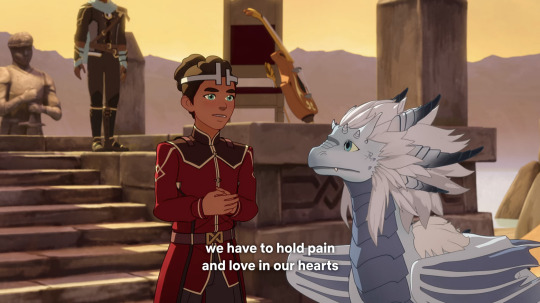
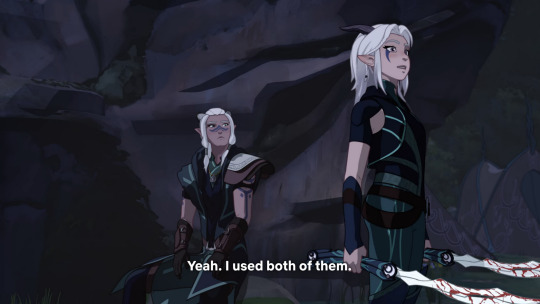


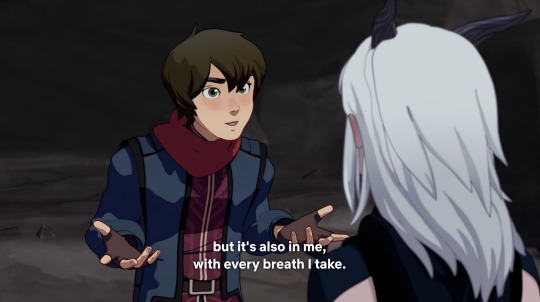
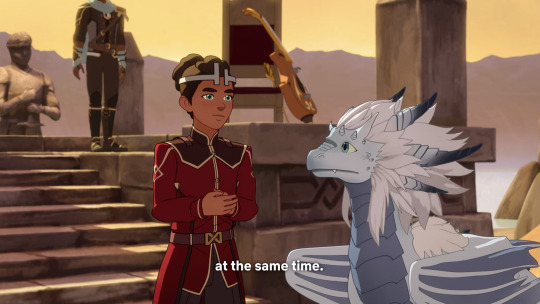
Humanity and Xadia can fail themselves and one another repeatedly, and each can still be worthy of growth and protection, because it's not about deserve. It's not about punishment. It's about rehabilitation and belief.
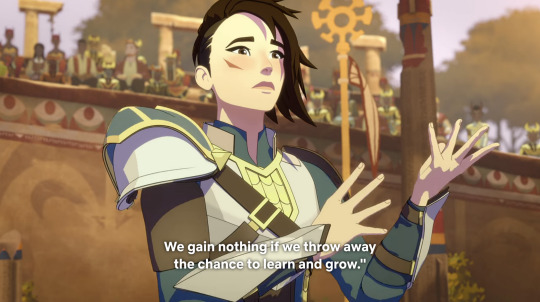
For Rayla and the Silvergrove, too.
#xadia#the pentarchy#the cycle#thanks for asking#requests#analysis series#analysis#shiramoonshadow#tdp#the dragon prince#tdp meta#this is why whenever dark magic stans are like 'xadia's portrayed too perfectly' i'm lke#wtf are you Talking about#theme: duality
70 notes
·
View notes
Text
Final thoughts/rant/whatever
- Yeah, Greece giving Cyprus meager 4 points meant that it's all doomed
- The real crimes of the juries were putting Israel 2nd and Estonia 5th
- My tweet asking Ukrainians not to vote for Poland got a surprising 1000+ likes and retweets. And guess what? IT DIDN'T FUCKING MATTER, 'CAUSE WE GAVE 12 POINTS TO POLAND ANYWAY сукакурванахуйблядь I hate it here
- Slovenia in the 21st place is makes me wanna put on Joker (hehe) makeup
- Germany putting in effort and still being dead last is just sad
And now for the big thing
Do I think that the show was "rigged" in Loreen's favor? No.
But I'm still upset and the difference of 163 points between her and jury's second place is absolutely fucking baffling.
The jury vote system is designed in such a way that huge point gaps are less likely to occur AND YET. May I remind you that in 2019 correcting the votes of one (1) country changed the jury winner.
I'm sure they will try to change the system somehow next year. After all, we've got the current system after Sweden won as a jury 1st, televote 3rd place.
That said. Oh my god, can you guys fucking chill? Stop with these ridiculous conspiracy theories. "It's because of ABBA's win anniversary", "Melfest was purposely made bad so she could win" - jeeeesus.
Loreen was second in the televote, she got points from literally every country except for Finland (obviously), it's not like she was pushed to the winning spot from out of the top 10. People, a lot of people, voted for her. She did have the whole package with a good song, great vocals and great staging. It's not like the juries handed Bridges a win.
Do you all have the memory of a goldfish and don't remember KEiiNO? Who also won the televote but not the whole thing? This is not the first time this is happenned, come on, shit like this is bound to occur sometimes.
"The juries were put in place because of the anti Eastern-European sentiment, we don't need them anymore". Yes, and also because the contest was filled with shit-tier joke entries fighting for the televotes.
"The televoters know what's best!" After 5 points (last place) to Blanca and 81 points (8th) to Blanka? After 16 points to Austria? Really?
Look. I am also upset at the result. I turned off my TV before the winner's repriese, for fuck's sake. I expected Loreen to fight for that 1st jury spot. I expected Käärijä to get between 60 and 100 jury points so I could give up my hopes before they even started announcing the televote results. But he was in the 4th spot, and I thought that maybe, just maybe he can still win. And that's why you should never get your expectations up, kids.
tl;dr: Käärijä deserved to win, but making up fucking conspiracy theories to justify your fave not winning is stupid and you all should chill and stream Cha Cha Cha or something. Give the green man those 0.003 dollars.
40 notes
·
View notes
Text
Seeing as this myrddin blocked me and is now spreading baseless accusations about me being a Russian agent.
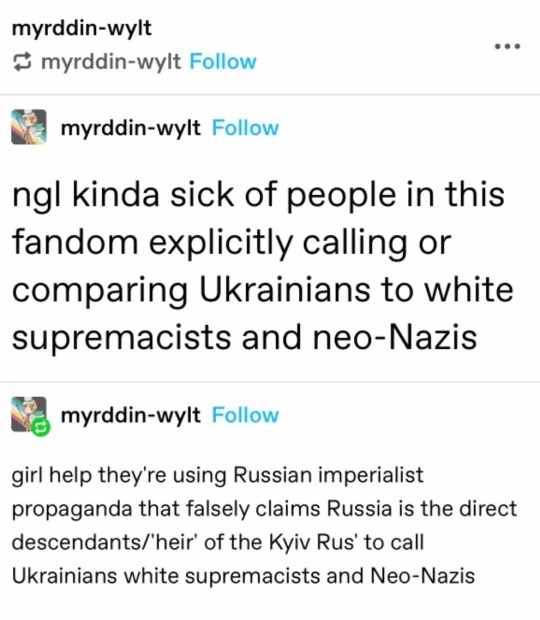
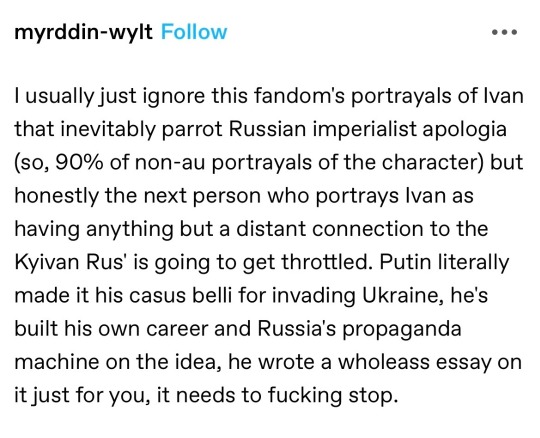
This is in reference to my post in which I explain using historical detail why it is incorrect to say that Mongols are ancestors/direct ancestors to Russians. I explain why it is not only incorrect to say this, but it also has the potential to harbour harmful rhetoric about Mongolians, Russians, and Eastern Europeans as a whole, as this pseudo-history is rooted in racial science and is used to spread slavophobia and anti Mongolian sentiment.
Here is my original post, please go and read it for yourself:
I explained that yes, the Mongols/Golden horde did have a lasting impact impact on Russian history, culture and identity, and it is important to acknowledge their contributions. But I also explained how the Mongol invasions did not include mass migration and assimilation of Mongol populations into Eastern European (compared to the other Khanates) and the Mongols were essentially a ruling elite - an outside force coming in.
I explained how people often exaggerate Mongol influence on Russia/Eastern Europe for more sinister reasons. I said how the core of Russian culture is Slavic, and how many different cultures have had an impact on the course of Russian history. I explained why it is important not to exaggerate Mongol influence on Russia/Eastern Europe to the extent that people run around saying how Mongols are ancestors to them, as it is not historically sound and is rooted in racial science/slavophobia.
The idea that Eastern Europeans in general are not "true Europeans" and are really just "Mongol mongrels" is not exactly a new concept. However there has been a surge of popularity in hurling the term "Mongol", "Mongol Hordes" as an insult towards Russians. Do you... Not see how this is a problem? Not only is it incredibly, incredibly racist towards the Mongolian people, to use their ethnic term to denote "barbaric", "backwards" or "savage", as I want to reiterate, this rhetoric has its origins in Nazi racial science, and is also slavophobic.
I said that the core of Russian culture is Slavic. Nowhere, in my post, did I ever dabble in debating on whether Russia is the direct heir or descendant to Kievan Rus', nor did I use this as a justification to label, Ukrainians as Nazis for wanting to defend their country from the Russian invasion, nor did I then go onto use this to justify a "denazification" of Ukraine.
If you take a look at my account, you can see that I am extremely critical of the Russian state.
Also I just think it's so... Typically American to accuse people you don't like of being a Russian agent lol.
In my post, I added this screenshot of someone tweeting anti-Mongolian sentiment in order to give an example of how pseudo-history and racial science gives way for anti-Mongolian sentiment to rear it's ugly head :

I was not calling a Ukrainian a Nazi for criticising Russia - this person is not even Ukrainian judging by his Irish name.
Even if this person was a Ukrainian, does that give them a right to throw around anti-Mongolian sentiment?? Do Ukrainians have free reign to hurl around the word "Mongol" like it's an insult and perpetuate harmful racial science??
I love how myrddin suddenly started Mongolia posting - pretending like they give a fuck about Mongolian culture, history and people, but then goes ahead and derails a post talking about anti-Mongolian sentiment and racial science and turns it into some fucking debate about Russia being or not being the heir of Kievan Rus when I NEVER EVEN SAID SHIT ABOUT THAT IN MY ORIGINAL POST. I EVEN SAID THAT MANY DIFFERENT CULTURES HAD A LASTING IMPACT ON THE COURSE OF RUSSIA'S HISTORY, IDENTITY AND CULTURE, AND I WASN'T TRYING TO SQUEEZE RUSSIA INTO A BOX OF "WHITE, SLAVIC" FOR THE SAKE OF MY ARGUMENT.
ALL I DID WAS EXPLAIN WHY IT IS IMPORTANT TO BE CAREFUL ABOUT EXAGGERATING MONGOL INFLUENCE TO THE POINT WHERE Y'ALL CALL MONGOLS ANCESTORS TO RUSSIANS WHEN ITS BOTH HISTORICALLY INACCURATE AND USED FOR OFFENSIVE RHETORIC
Myrddin - can you even read? 🤭
@myrddin-wylt
#hetalia#aph mongolia#hws mongolia#Hetalia Mongolia#hetalia world stars#hetalia world series#hetalia world twinkle#Aph Russia#Hws Russia#Hetalia Russia#Ivan Braginsky#Hetalia discourse#Hetalia fandom#Historical hetalia#Hetalia critical#Hetalia racism#Myrddin-wyllt
24 notes
·
View notes
Text
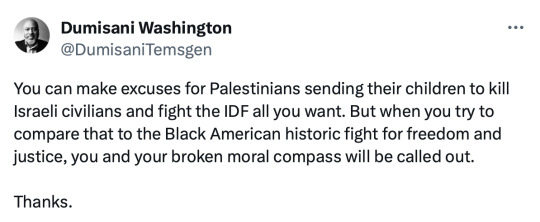
7 reasons why the Palestinian crisis & the Black struggle for freedom are absolutely nothing alike
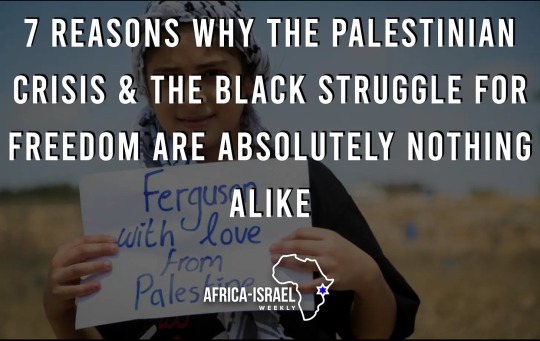
The “parallels” between the Palestinian plight and that of African-Americans have been made for decades, and this has always been spurious. Sadly, the exercise continues and seems to be growing as anti-Israel sentiment including global Boycott, Divestment and Sanctions (BDS) inexplicably gain credibility.
1. UNRWA
Beginning operations on May 1, 1950, the United Nations Relief Works Agency for the Palestinian people is the only UN relief agency that exists exclusively for one group — the Palestinians. At the time of its founding, there were some 720,000 Palestinian refugees. Many of these people became refugees after refusing the offer to become Israeli citizens and choosing to await the great victory over the Jews promised to them by the leaders of the Arab states.
Black Americans from slavery to Jim Crow to the civil rights era never had anything that vaguely resembled UNRWA or any type of international relief agency. We were also unsuccessful at being declared refugees — which surely would have led to reparations for 400 years of forced servitude.
2. INTERNATIONAL AID
The Palestinian Authority (formerly the Palestinian Liberation Organization – PLO) receives about $1 billion annually. This money comes primarily from American and European taxpayers. The money is supposed to go to relieve the suffering of the Palestinian people which, as Dr. King said in 1968, “are part of that third world of hunger, of disease, of illiteracy.” Unfortunately, much of that aid goes to political and racial propaganda and programming, as Palestinian children are fed a constant diet of anti-Semitism and hatred for Israel. From curriculum to suicide bomber camps, Palestinian children are taught to hate Israel and the West — on our dime.
Black Americans received no international aid during centuries of slavery and Jim Crow segregation. Neither did we receive domestic aid. The very term “forty acres and a mule” (what the US government promised former Black slaves, but didn’t deliver) became code for, “what we never got.” Money to help fund our quest for freedom came almost exclusively from private donors including Black businesses and families, White abolitionists, churches, synagogues, and other Jewish organizations and individuals.
3. ARAB STATES (Arab League)
In the Middle Eastern region alone there are multiple Arab homelands including Egypt, Jordan, Syria, Lebanon, and oil-rich Saudi Arabia. They were the dominant force in the Middle East when Israel was reestablished in 1947-48, and used their combined military might to attempt to crush the nascent Jewish State. They failed. Now, not only will these states not take in the Palestinians who have been given official refugee status for three generations, these nations also have a horrible record of human rights abuses against their Arab-Palestinian brothers. They will not allow them to live as citizens, enroll in school, buy property, or even repair their dilapidated dwellings. Palestinian refugees are being killed in Syria while you read this.
Black Americans had no Black nations to which we could turn for help or shelter. While we were enslaved in America, our continent had been colonized by the Europeans. Further, all of North Africa is currently being occupied by Arabs, who stole it from our people. But that’s another list.
4. TERRORISM & TERRORIST ORGANIZATIONS
Other than Nat Turner and a few rebellious slaves whom history has forgotten, Black victims of oppression never possessed the means to offer armed resistance to our oppressors during slavery. After slavery (and due to the legal right to purchase guns), Black Americans were able to arm themselves but had no access to rockets, rocket launchers, IEDs, or other explosives.
If Black Americans had been able to fight with weapons, you can be certain that blowing up our sons and daughters would not have been a strategic option. Ever. Under any circumstances.
5. PALESTINIAN ROCK THROWERS & INSTIGATORS
Pictures of Palestinians throwing rocks at, or dropping boulders on unsuspecting Jewish motorists are quite strange to informed Black Americans (my grandmother would have called those rock throwers ‘hoodlums’). During the civil rights struggles of the 1950s and 1960s our ‘weapon’ was non-violent resistance. This was by choice and by necessity, as we were vastly outnumbered and outgunned by the White majority. We could not imagine what would have happened to our young men had they stood at ambush on the roads of Montgomery, Alabama, or Jackson, Mississippi, and thrown rocks at White passers-by. We were lynched for simply breathing while Black.
6. UNHRC
The United Nations Human Rights Council has condemned Israel more than any other nation — combined. In fact, since 1975, over 40% of the UNHRC’s indictments have been against Israel. This imbalance is a result of the Arab states’ undue influence over the UNHRC, as they have worked in tandem with the enemies of the US to discredit and delegitimize the Jewish State. The UNHRC is a large part of the reason that even the casual follower of world events may view Israel in a negative light.
Not only did Black Americans ever have something like a League of Nations to condemn our enemies, the UNHRC further insults us by largely ignoring the suffering of African people in places like Sudan, Eritrea or Congo; or Egypt/Sinai where African slavery and organ harvesting is taking place. This disparity prompted former UN Secretary-General, Kofi Anan to comment, “Since the beginning of their work, [the UNHRC] has focused almost entirely on Israel and there are other crisis situations, like Sudan, where they have not been able to say a word.”
7. ARAB REPRESENTATION IN ISRAELI GOVERNMENT
Not only are there Arab members of the Israeli Parliament (Knesset) and the Supreme Court, some of the individuals are actively working to destroy the Jewish State. They are very vocal anti-Zionists, and their speech (as well as their legislative action) are all protected by Israeli law.
Black Americans did not become a part of the legislative system until after slavery during Reconstruction. We were exclusively Republican by default, as the Democrats were the party of slavery, Jim Crow, and the KKK. We never called for the destruction of America. We have a long, proud tradition of working within the American legal system to address violations of civil and human rights — for everyone. This process reached its zenith during the 1960s as Black leaders and lay people (led by Dr. King and other stalwarts) marched on Washington, D.C. demanding jobs, justice, and equal treatment under the Constitution. 400 years of hard work resulted in Black people helping to make America the greatest democracy on earth.
There are many more than seven reasons why the Black saga and the Palestinian plight should not be compared, but I believe sufficient point has been made.
Lastly, I do not spurn the Palestinian fight for self-determination. Every fight for justice is a righteous struggle. I would just say that, what made the Black historic struggle effective was our remembering who our enemy was — and who it was not. In the interest of defending Palestinian human rights, one may want to start with the main perpetrators: The Palestinian Authority and Hamas. But again, that is the subject of another discussion.
20 notes
·
View notes